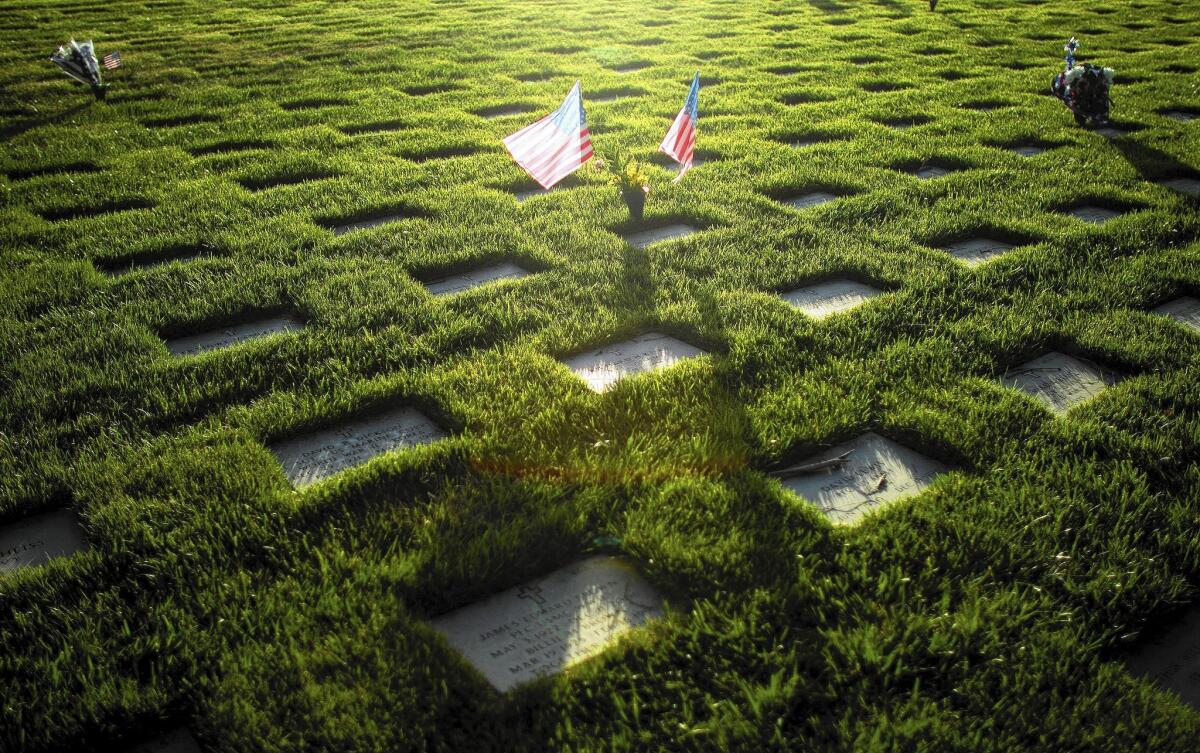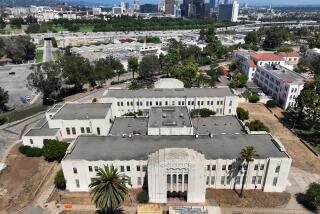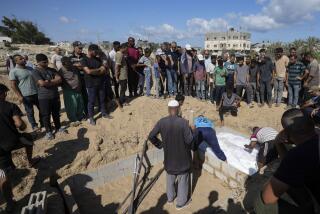Bodies of 52 vets accumulate at morgue; L.A. County canât explain why

Over the last 15 months, 52 unclaimed bodies of U.S. military veterans accumulated at the Los Angeles County morgue because nobody arranged transportation to Riverside National Cemetery for burial.
As of Thursday, the county could not explain why. âAll the people who touched this process are working together to figure out how this occurred,â said county spokesman David Sommers.
The problem began in 2013, after Rose Hills Mortuaries in Alhambra, which transported the bodies of homeless veterans under a charity program, started turning down some bodies that it said did not meet eligibility requirements.
Jessica McDunn, a spokesperson for Rose Hillsâ parent company, Service Corp. International of Houston, said that the program is limited to homeless veterans and that Rose Hills does not accept a body if the deceasedâs family has been located, even if the family is unwilling to claim the remains.
Rose Hills remained willing to provide transportation for homeless veterans whose next of kin could not be located, McDunn said, but started rejecting cases that did not qualify.
The Rose Hills program transported 134 bodies in 2010 and 146 the next year. But the number fell to 102 last year, and in the first four months of this year, the total was just 16.
McDunn said the mortuaryâs charity program covers about $2,800 in expenses â including preparation of the body, a casket, funeral and transportation. The federal government reimburses the company no more than $300, McDunn said.
As transportation dropped off, bodies began to accumulate at the morgue, which is located at Los Angeles County-USC Medical Center. The earliest deaths occurred in February 2013, according to statistics provided by the coroner. By the end of the year, the total was 20.
Then the pace picked up, with 23 more deaths this January and February. By mid-April, there were 52 bodies.
One of them was Frederick Echeverria, who had served in the Navy from 1959 to 1964 in San Diego.
Echeverria died at age 71 on April 13, 2013, at Citrus Valley Medical Center in Covina. A retired lithographer, he had been in failing health since a stroke three years earlier and was on dialysis, his son, Fred Echeverria, said Thursday.
Echeverriaâs widow and her three children accepted an offer from the county morgue and county Department of Military and Veterans Affairs to handle his burial. âWe didnât have a great financial situation,â the son said.
Last week, the coronerâs office called the family to say that Echeverria still had not been buried. Officials apologized and promised to explain the yearlong delay once they figured out what happened, Echeverria said.
He added that he was less traumatized by the news than the rest of his family. âThe shell that held my father did not have a great significance for me,â he said. âHis soul was already with God.â
Various county departments have been trying to fix the transportation problem for weeks, but top officials did not learn about the issue until last week, Sommers said. Last Friday, 44 of the bodies were taken to the coronerâs office, which is now coordinating the burials, officials said. Eight more had been moved there from the morgue earlier this month.
The coronerâs office â which normally handles only suspicious deaths â has an in-house program to transport unclaimed bodies of veterans to the Riverside cemetery. Most of the bodies spend between three and nine weeks at the coronerâs office while their identities are verified and burial arrangements are made, said Craig Harvey, chief of investigations at the coronerâs office.
As for the 52 bodies that arrived from the morgue, the coronerâs office must follow its standard protocol and independently verify the identities of the dead, Harvey said. In most cases, federal approval for the burials has probably expired, and reauthorization will be required.
Harvey said about a dozen of the veterans had been identified and could be buried in the next few weeks. Names are being withheld while next of kin â when they exist and can be tracked down â are notified.
Other cases could take longer, because fingerprints, dental records or X-rays may be required to confirm their names and veteran status.
âWhen they were discovered, they may have been decomposed,â Harvey said.
The dead were men in their 60s, 70s and 80s who had served in World War II, Korea, Vietnam or during peacetime, he said. All had been under the care of doctors at some point and had death certificates.
County Supervisor Don Knabe said he was outraged to hear about the delays and asked county staff to change procedures so such a lapse doesnât happen again.
Speaking to the Board of Supervisors this week, Ruth Wong, director of the countyâs Department of Military and Veterans Affairs, said a new agreement had already been made with another transport provider to handle future cases and that two more providers would also be added.
Times staff writer Abigail Sewell contributed to this report.
More to Read
Sign up for Essential California
The most important California stories and recommendations in your inbox every morning.
You may occasionally receive promotional content from the Los Angeles Times.











